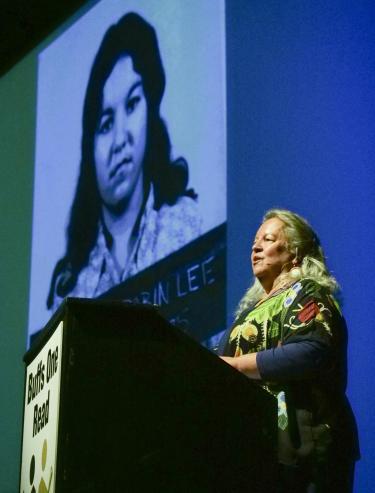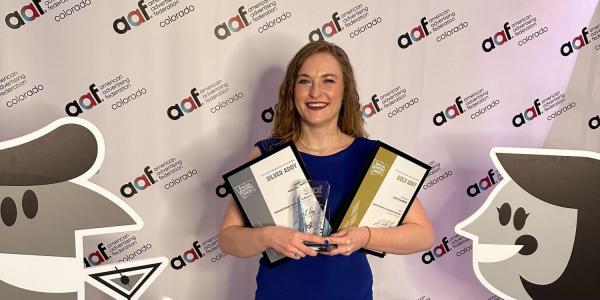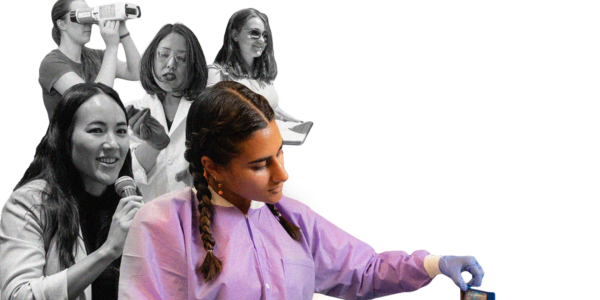On Robin Wall Kimmerer’s first day of school at SUNY College of Environmental Science and Forestry in Syracuse, New York, she had a quick and heartfelt answer when her botany professor asked why she wanted to study plants.She wanted to know why goldenrods and asters look so beautiful together and how other plants are able to make medicine.
“He looked at me and said, ‘My dear, that is not science. If you want to study beauty, you should have gone to art school,’” recalled Kimmerer, a member of the Citizen Potawatomi Nation, before a standing-room only crowd at the Boulder Theater Thursday. “I felt like I had just knocked on the door of a club that didn’t want me or my way of thinking.”
Decades later, Kimmerer runs the Center for Native Peoples and the Environment at SUNY, located just down the hall from where that deflating conversation took place.
In 2022, she was awarded an $800,000 MacArthur Fellowship, or “Genius Grant,” one of the most prestigious awards a writer or scientist can earn. And as a botanist and author of the bestseller, Braiding Sweetgrass: Indigenous Wisdom, Scientific Knowledge, and the Teachings of Plants, she has become a vocal advocate for what she calls “two-eyed seeing,” a worldview that incorporates Indigenous wisdom with Western scientific tools to address the world’s greatest problems.
Kimmerer will participate in the Traditional Knowledge and Climate Solutions panel at 1:30 p.m. on Sunday, Dec. 4.
The event, part of the Buffs One Read program sponsored by University Libraries and Student Affairs, set a hopeful tone for a spellbound audience made up largely of students in the lead-up to this weekend's Right Here Right Now Global Climate Summit.
“It’s time we engage in Indigenous knowledge not so that we can go back to some imagined past but so we can go forward together and find solutions that are not embedded only by the Western worldview,” she said.
Two-eyed seeing
The first step in achieving that two-eyed seeing, she said, is to re-evaluate the language we use.
She contends that the term “natural resources” paints the land as “raw materials yet to be converted into products we want them to be.” And the term “sustainability” sounds like “they are just trying to keep on taking.” Even the way the English language refers to animals and plants—as “it”— is objectifying.
“Imagine if your beloved grandmother walked into the room with some cookies and you said, ‘It brought us a snack,’” she said. “That would take away her agency as anything other than a provider of cookies and diminish her. We are, in essence, ‘it’-ing the world.”
Born in upstate New York, of Potawatomi heritage, Kimmerer was raised to see the ecosystem as community, not machine; land, water and animals as kin, not capital.
Instead of viewing humans as exceptional among the millions of species, she was raised with a “kincentric world view” in which humans are one part of an interconnected web.
In what she called a “modest proposal to transform the English language,” she and some of her students recently came up with a new pronoun for animals and plants. Inspired by animistic traditions that attribute them with a soul, they use the word kí (singular) and kin (plural) instead of it.
“So often solutions are framed in terms of new technology, and yes, we need that too, but we also need a change in worldview,” she told the audience.
Kimmerer was quick to note progress has been made since her college days.
The Biden administration recently issued an executive order saying Indigenous knowledge should be elevated in all federal land decision-making. And land management agencies have begun to turn to Indigenous people for strategies on how to maintain biodiversity (which is declining most slowly on Indigenous lands) and manage fire.
While addressing the existential threat that is climate change can feel daunting, she left her audience with two parting messages. For students: “Don’t do what I did in that first year of college and shut down and sit in the back of the room. Raise a ruckus.”
And for everyone else: Adopt a simple Indigenous strategy, the “honorable harvest,” around consumption.
“Most of us find ourselves enmeshed in institutions and economies that are relentlessly asking what more can we take from the earth. Here, poised on the cusp of climate catastrophe, the question we need is: What does the earth ask of us?”
The Honorable Harvest
This Indigenous covenant of reciprocity between humans and the land offers a prescription for picking berries and much more. It also addresses the consumer-driven roots of climate change.
- Never take the first one.
- Ask permission.and listen for the answer.
- Take only what you need and be grateful
- Minimize harm
- Share what you take
- Reciprocate the gift






